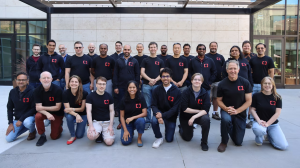WhatsApp will open the door to Facebook’s next wave of expansion
![]() So Facebook has just shelled out a jaw-dropping $19 billion on WhatsApp, a seemingly insane price when you think another popular messaging app called Viber was acquired for a ‘measly’ $900 millin by Japan’s Rakuten just one week ago.
So Facebook has just shelled out a jaw-dropping $19 billion on WhatsApp, a seemingly insane price when you think another popular messaging app called Viber was acquired for a ‘measly’ $900 millin by Japan’s Rakuten just one week ago.
For sure, $19 billion is a massive amount of cash, but when you think about the deal from Facebook’s perspective (and when you have a wallet of its size), it actually makes perfect sense. The deal not only keeps WhatsApp out of the hands of Google, but more importantly, it removes one of Facebook’s most aggressive competitors from the instant messaging arena, a battlefield that its determined to conquer.
Facebook is desperate to come out on top as it sees this kind of service as being vital to its long-term plans. We know this because it’s been pushing its own Messenger platform extremely hard, yet its struggled to make a much of a dent in its rivals territory. Now though, Facebook has transformed itself into a serious competitor to apps like Line and WeChat, simply because WhatsApp is the biggest of them all. It remains to be seen what kind of plans Facebook has for monetizing WhatsApp – as SiliconANGLE’s Mellisa Tolentino points out, it doesn’t earn that much – but certainly some kind of advertising will be on the cards. There’s also the possibility Facebook may try to add other elements to WhatsApp, such as stickers and games (rival Line makes a killing out of this).
But why does Facebook want to be a messaging platform so badly? Simply because, it has to be. In the increasingly high-stakes game of global internet dominance that’s being played out between Google, Facebook, and to a lesser extent, Microsoft and Apple, it makes sense from a strategic viewpoint. Companies like Facebook just have to keep on growing, or one day they’re gonna go bust – but Facebook’s problem is that it’s running out of room to expand at home. Now it’s trying to focus on SMS and mobile web technologies in order to target users of ‘feature phones’ in developing countries, whilst working to bring internet access to places in the world where it doesn’t yet exist. Because in a lot of developing countries most people only access the web via their phones, it’s making big investments in mobile-only users, and the WhatsApp deal is an extension of this policy.
By buying WhatsApp, Facebook is forcing its way into new markets. WhatsApp isn’t only popular in the US, its expanding all over the world, signing up about a million new users ever single day. That’s not to say these people are instantly going to become Facebook users now that it owns WhatsApp, but what it does get is business intelligence on these users – it will get to learn how they think, what phones and features they use and need, their bandwidth requirements, their devices and platforms, and of course, their personal information – exactly the kind of intelligence it needs to drag these people into its own social network.
A message from John Furrier, co-founder of SiliconANGLE:
Your vote of support is important to us and it helps us keep the content FREE.
One click below supports our mission to provide free, deep, and relevant content.
Join our community on YouTube
Join the community that includes more than 15,000 #CubeAlumni experts, including Amazon.com CEO Andy Jassy, Dell Technologies founder and CEO Michael Dell, Intel CEO Pat Gelsinger, and many more luminaries and experts.
THANK YOU











